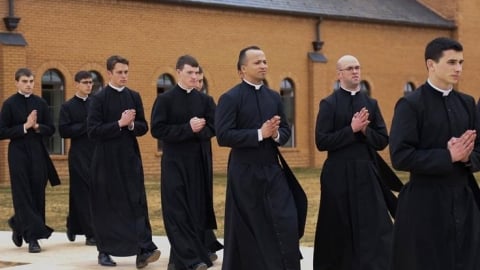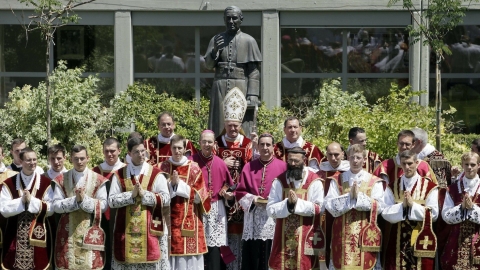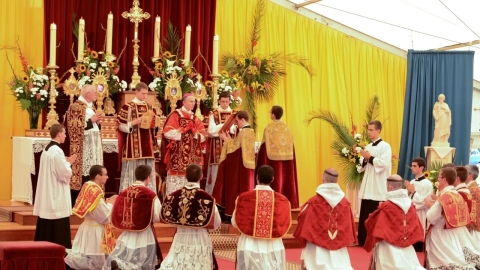The Apostleship of Prayer

Father Francis X. Gautrelet, S.J., spiritual director of several score of young religious, was faced for the first time by an old problem. He was to give the community instruction to the young men in his care, and he wanted to make it as practical as possible. He knew their great zeal and generosity, and how anxious they were to get down to the actual work of their calling: preaching, hearing confessions, teaching. But in this secluded country town of southern France, these men were still faced with the prospect of years of hard study. Carefully, he examined the elements of their life as it was: much prayer, much study, some recreation, with now and then a slight taste of work with souls in teaching catechism in nearby schools. Undisturbed recollection, hard work, and (in such a large community) unlimited opportunity for self-mastery and self-discipline — here were the elements that make for sanctity. If only he could find a driving motive that would somehow intimately connect their present status with the work of the ministry which they so desired!
It was December 3, 1844, the Feast of his own patron, Francis Xavier. Perhaps it was the Apostle of the Indies who inspired him and gave him the solution to his problem, a solution that has been an answer to the same problem for countless spiritual directors of religious ever since and that has been productive of untold good for a hundred years. Father Gautrelet told his listeners that they could, if they wished, make their life of prayer and study (even in the seclusion of Vals) just as fruitful an apostolate as that of any actual worker in a large city like Paris, or in the missions of the Indies or the Americas. Prayer itself is an apostleship. If they would offer all their work and study for the good of souls, making their whole day and everything they did a prayer in union with the heart of Christ, they would amass a treasury from which each could draw for his own intentions.
His simple words struck fire. Within a few days, a list of intentions was drawn up, containing the great needs of the Church throughout the universe. These were recommended to the prayers of all, as both an objective and an incentive. It was really a sort of "Co-op" or "Credit Union" of prayer. Among the students at the scholasticate of Vals, young men from France itself were in a minority. It was more or less an international house, with numerous representatives from Spain, Italy, England, Ireland, and Germany. These men enthusiastically wrote to their home provinces about this new apostleship. This was the beginning of its rapid spread through the whole of Europe. Closer to home, the catechists among the seminarians soon learned how easily the idea could be adapted to ordinary laypeople living in the world. To help spread it even further, Father Gautrelet published his little book, The Apostleship of Prayer, in 1846. There we read of the three elements that constitute the Apostleship: prayer, prayer in common, and in union with Jesus Christ; zeal to inspire the prayers themselves, and to transmute everyday actions and trials into prayers; and lastly, union and an exchange of benefits, a mutual understanding of the pressing needs of the Church and of the interests of Christ in the world.
The Apostleship grew rapidly and spread all over the world in the course of a few years. By 1861, Father Gautrelet realized that its direction was beyond his capacity. He therefore enlisted the recognized talents of Father Henry Ramière, S.J., who had been among those present at the inauguration of the Apostleship in the scholasticate at Vals. Father Ramière had a great reputation as an eloquent orator and retreat master all over Europe. Destined at first for missionary work in the southern part of the United States, his superiors sent him to the famous college at Stonyhurst in England. Plans were changed, however, and he was retained at Stonyhurst for four years as a teacher, and later for twenty years at Vals. A more zealous or talented man could hardly have been found for the work Father Gautrelet gave him. His first step in the organization of the Apostleship was to clarify and summarize the sound theological principles on which it was founded. This he did systematically in his book, The Apostleship of Prayer, in League with the Sacred Heart.
It is interesting to note that from this date the association was known by either title or by both: "The Apostleship of Prayer," and the "League of the Sacred Heart." Father Ramière added nothing to the elements of the Apostleship by lengthening the title, except to make still more clear what its aims had been from the beginning. The book went through five editions in little more than twice that many years. To further systematize and order the workings of the League, Father Ramière decided on the publication of a periodical, which he called The Messenger of the Sacred Heart. The first issue appeared in June 1861. Five years later, the first American edition was edited by Father Benedict Sestini, S.J. Father Ramière lived to see his work spread far and wide, with twenty "Messengers" appearing in a dozen different languages.
We also owe to this zealous Father Ramière the consecration of the whole Church to the Sacred Heart: Appointed official theologian of the Bishop of Beauvais at the Vatican Council in 1869, he secured the signatures of two hundred and seventy-two Fathers of the Council for the petition for the worldwide consecration. On April 22, 1875, Pope Pius IX granted a Plenary Indulgence to all who participated in the Act of Consecration and gave to Father Ramière the responsibility of announcing this fact to all the bishops of the world through the directors of the Apostleship of Prayer. The consecration itself took place on June 16th of that same year. Besides these two great men, Father Gautrelet, the founder, and Father Ramière, the organizer, of the League of the Sacred Heart — we must also make mention of Father Victor Devron, S.J. He it was who instituted the practice of the Communion of Reparation, which has long been identified with the Third Degree of the League.
From the relatively few members with which this Association started in the little town of Vals a hundred years ago, and by the efforts of their brethren all over the world, it has grown to an organization of thirty million Catholics enrolled in one hundred thousand local centers. No small measure of this growth is due to religious Brothers and Sisters, especially those who teach in grammar schools. The good effected by their magnificent work in spreading and maintaining interest in the League is all but incalculable. The note of union, of many hearts praying as one for the same intention, is characteristic of the League. The custom of asking the Holy Father to bless and confirm the Monthly Intentions of the League was begun in the reign of Pope Leo XIII. From the very beginning, the popes have always been remarkably generous in their blessings and recommendations of the League. Pope Benedict XV spoke very highly of it in his circular letter on the Missions, Maximum Illud: "If there is one intention for which our prayers will surely be heard, it is that for the Missions, an intention very fundamental and pleasing to God. To help Christians do their part in this matter, the work of the Apostleship of Prayer was founded. We recommend this organization most earnestly to all the Faithful without exception, desiring that everyone be enrolled in it and try to cooperate, if not physically, at least in spirit, in the work of the Missions." That, surely, is proof of the apostolic value of the League.
Speaking to a group of directors in 1925, Pius XI said, "You are the voice and the apostles of Our intentions, which you recommend to the prayers of your Associates. In that thought is our hope and peace in the midst of abundant sorrow and sadness.' In this Jubilee year of the Apostleship, nothing could be better done by way of celebration than to renew and deepen the original spirit of its founders and organizers. How important this is in the light of present economic conditions and worldwide war could hardly be better expressed than by these words of our present Pope, Pius XII, in his recent encyclical on the Mystical Body of Christ. "From a father's heart We appeal to all who from whatever cause are plunged into grief, to lift their eyes in confidence to heaven, and to offer their sorrows to Him who will one day reward them abundantly. Let them remember that their sufferings are not in vain, but will be to their great gain and that of the Church, if for this purpose they but take courage and bear them with patience. To make this intention efficacious, the daily use of the offering made by the members of the Apostleship of Prayer will contribute very, very much; and We welcome this occasion to recommend that Association highly, as one which is most pleasing to God."
To see to it that the wishes of the Holy Father in this matter are carried out is the glorious privilege of every member and especially every promoter of the Apostleship of Prayer. If it is brought about that the suffering wrought by the present war is not wasted but used as most efficacious prayer in this apostolate, it will be due, in large measure, to the religious who teach in our schools and nurse the sick and the wounded in our hospitals. There could be no better way of celebrating the anniversary of the Apostleship of Prayer in League with the Sacred Heart than to work with might and main that this suffering be not wasted, but turned to prayer and to God's greater glory, through the Sacred Heart.





